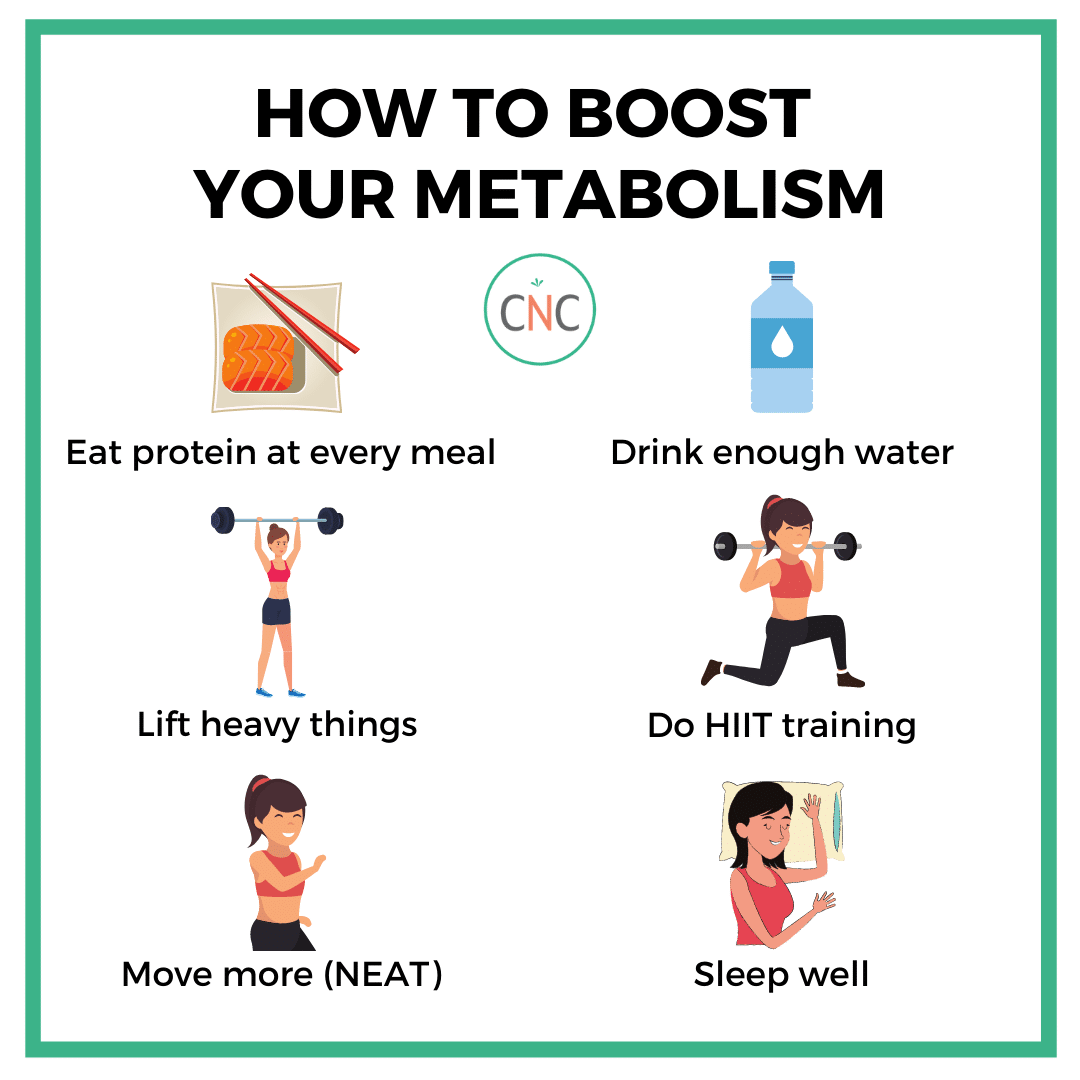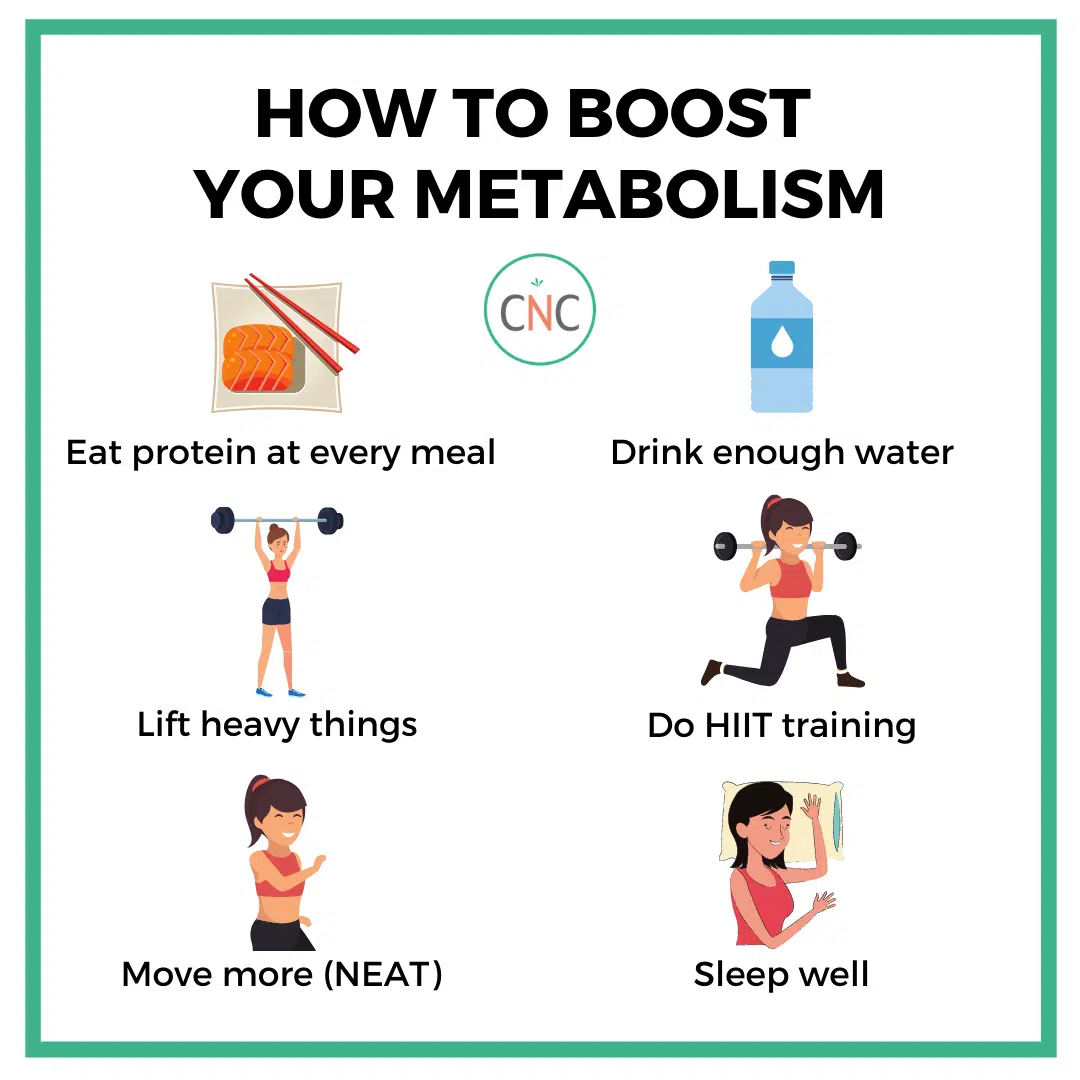6 Steps To Raise Metabolism
To raise your metabolism, focus on strength training, eating protein-rich foods, staying hydrated, getting enough sleep, and reducing stress levels. These steps can boost your metabolism naturally and help you burn more calories throughout the day.
By following these simple strategies, you can optimize your body’s metabolic rate and improve your overall health and fitness. Incorporating these habits into your daily routine can make a significant difference in your energy levels and weight management goals. Making small changes can have a big impact on your metabolism over time, leading to lasting improvements in your health and well-being.
Start implementing these steps today to rev up your metabolism and feel your best.

Credit: www.wikihow.com
1. Importance Of A High Metabolism
1. Importance of a High Metabolism
Having a high metabolism is crucial for maintaining good health and an optimal weight. Metabolism refers to the chemical processes that occur within the body to convert food and nutrients into energy. It directly impacts the body’s ability to burn calories and fat, serving as the foundation for overall health and well-being.
1.1 Benefits Of A Fast Metabolism
A fast metabolism comes with numerous benefits that contribute to a healthy lifestyle. These advantages include:
- Efficient calorie burning
- Enhanced weight management
- Increased energy levels
- Improved digestion
- Reduced risk of obesity
1.2 Effects Of A Slow Metabolism
Conversely, a slow metabolism can lead to various negative effects on the body, such as:
- Difficulty losing weight
- Feeling consistently fatigued
- Digestive issues
- Increased risk of weight gain
- Sluggishness and decreased energy levels
2. Consume Protein-rich Foods
2. Consume Protein-rich Foods
Eating protein-rich foods is essential for boosting your metabolism. Protein helps in building muscle, which in turn increases the number of calories your body burns at rest.
2.1 Role Of Protein In Boosting Metabolism
- Protein requires more energy to digest than fats or carbohydrates.
- It helps in maintaining and repairing tissues, contributing to a higher metabolic rate.
2.2 Examples Of Protein-rich Foods
| Food | Protein Content |
|---|---|
| Chicken Breast | 25g per 3-ounce serving |
| Greek Yogurt | 17g per 6-ounce serving |
| Quinoa | 8g per cup |
| Lentils | 18g per cup |
Include a source of protein in every meal and snack to keep your metabolism fired up throughout the day.
3. Stay Active And Exercise Regularly
When it comes to boosting metabolism, staying active and exercising regularly is key. Physical activity plays a crucial role in keeping your metabolism functioning optimally.
3.1 Benefits Of Physical Activity On Metabolism
- Increases calorie burn
- Improves muscle mass
- Enhances insulin sensitivity
3.2 Recommended Types Of Exercises
- Cardiovascular exercises – running, swimming, cycling
- Strength training – weightlifting, resistance bands
Cardio boosts heart rate and calorie burn while strength training builds muscle mass, both contributing to an efficient metabolism.
4. Get Enough Sleep
Raising your metabolism is crucial for maintaining a healthy weight and overall well-being. Getting enough sleep is an often overlooked but essential aspect of boosting your metabolism. The relationship between sleep and metabolism directly impacts your body’s ability to burn calories efficiently, making it essential to optimize your sleeping habits.
4.1 Relationship Between Sleep And Metabolism
- Sleep deprivation can lead to decreased insulin sensitivity and increased cortisol levels, both of which can slow down metabolism.
- During sleep, the body repairs and rebuilds tissues, which is essential for maintaining a healthy metabolism.
- Insufficient sleep can disrupt hormones that regulate appetite, leading to overeating and weight gain.
4.2 Tips For Improving Sleep Quality
- Establish a consistent sleep schedule, aiming for 7-9 hours of sleep each night.
- Create a relaxing bedtime routine, such as reading or practicing deep breathing exercises, to signal your body that it’s time to wind down.
- Avoid caffeine and electronics before bed, as they can interfere with your body’s natural sleep-wake cycle.
- Ensure your sleeping environment is comfortable, dark, and cool to promote uninterrupted sleep.
- Engage in regular physical activity, but avoid vigorous exercise close to bedtime.
5. Stay Hydrated
Hydration plays a crucial role in boosting metabolism and maintaining overall health. When it comes to increasing your body’s metabolic rate, staying hydrated is a simple yet often overlooked step. Let’s explore why staying hydrated is so important and how much water you should be drinking daily.
5.1 Importance Of Hydration For Metabolism
Proper hydration is essential for a well-functioning metabolism. When you’re dehydrated, your body’s ability to burn calories efficiently can be compromised. Staying hydrated helps to regulate body temperature, transport nutrients, and remove waste products from cells, all of which contribute to a healthy and balanced metabolic process.
Sufficient water intake is particularly important for fat metabolism. Studies have shown that staying hydrated aids in the breakdown and utilization of fat stores, which can lead to increased energy expenditure and potential weight loss. So, don’t forget to prioritize hydration for optimal metabolic function.
5.2 Recommended Daily Water Intake
The recommended daily water intake varies depending on several factors, including your age, sex, activity level, and climate. However, as a general guideline, it is recommended to drink at least eight 8-ounce glasses of water each day. This equates to roughly two liters or half a gallon.
However, keep in mind that this is a baseline recommendation and individual needs may vary. Factors like exercise, illness, and breastfeeding may require higher water intake. Take cues from your body — if you feel thirsty, it’s a sign that you should drink more water.
In addition to plain water, you can also include other hydrating beverages like herbal tea, infused water, or low-sugar sports drinks. However, avoid excessive consumption of sugary drinks or caffeine, as they can have dehydrating effects.
To make sure you stay on track with your hydration goals, it can be helpful to carry a water bottle with you throughout the day. Set reminders and establish a routine to ensure you meet your recommended daily water intake for improved metabolism and overall well-being.

Credit: www.wikihow.com

Credit: carrotsncake.com
Frequently Asked Questions For 6 Steps To Raise Metabolism
How Can I Increase My Metabolism Naturally?
To boost your metabolism naturally, try eating protein-rich foods, staying hydrated, exercising regularly, and getting enough sleep.
What Are Some Effective Exercises To Raise Metabolism?
Engaging in high-intensity interval training (HIIT), weightlifting, and cardiovascular exercises like running or cycling are excellent ways to increase your metabolism.
Does Drinking Water Help Increase Metabolism?
Yes, drinking water can temporarily boost your metabolism by about 24-30%. Aim to drink at least 8 cups (64 ounces) of water per day to maximize its benefits.
Conclusion
Boosting your metabolism is vital for overall health and weight management. By incorporating the six steps – such as exercising regularly, staying hydrated, and consuming metabolism-boosting foods – into your daily routine, you can effectively rev up your body’s natural calorie-burning process.
Take charge of your health and make these small changes to see big results.





